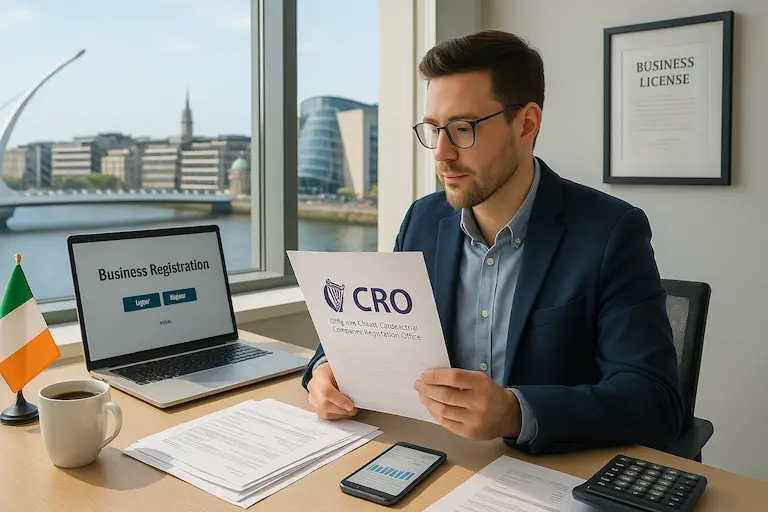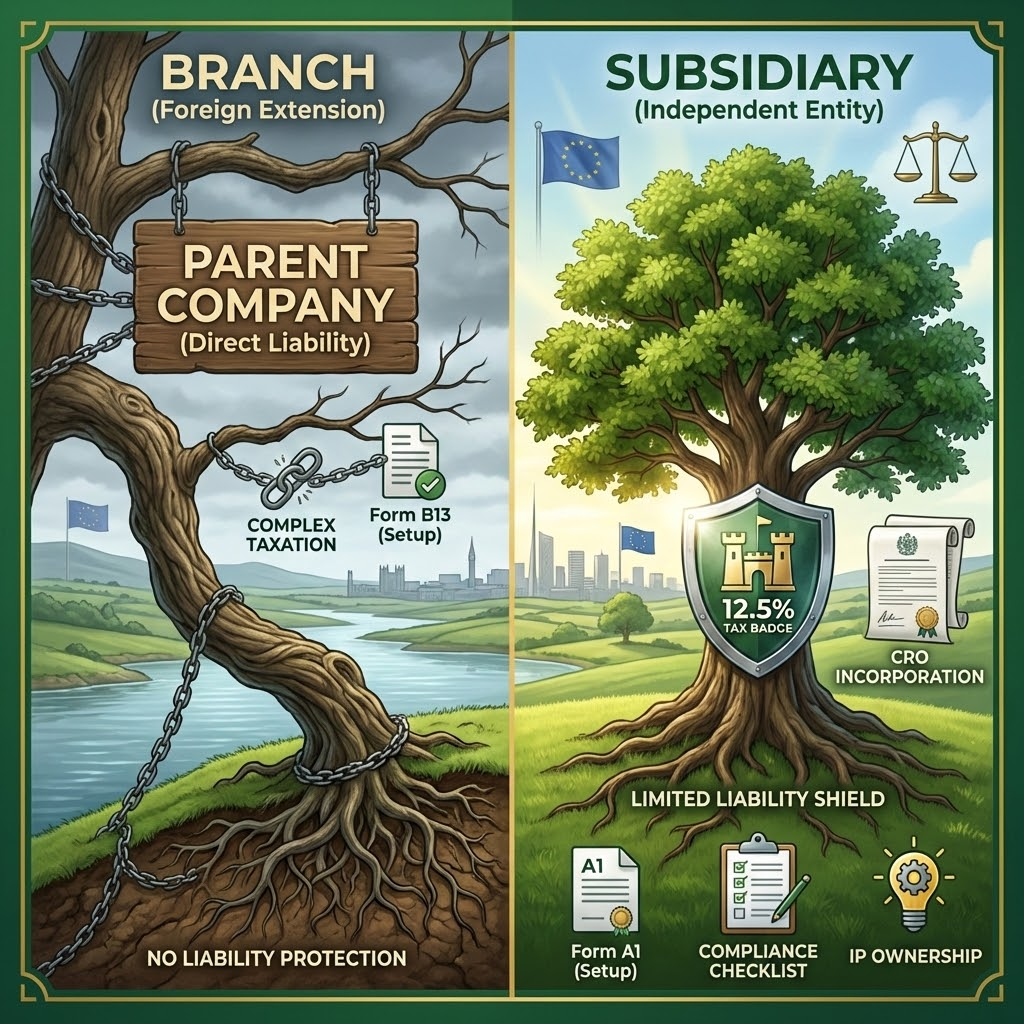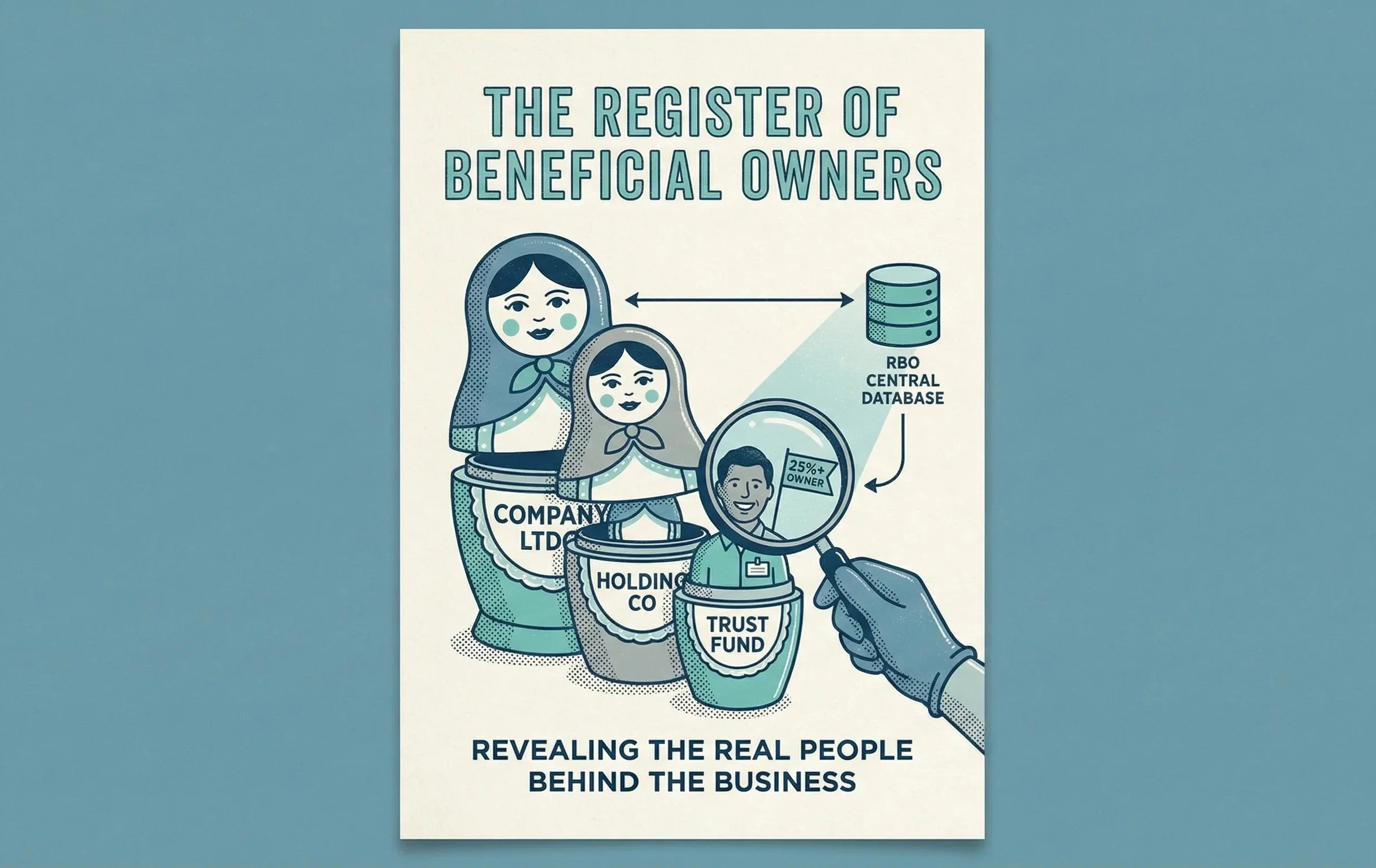You should read this article if you are an entrepreneur starting or running a business in Ireland and are considering the potential for future growth and a possible company sale.
There are two main types of holding companies: (1) group holding companies and (2) personal holding companies. This article focuses on personal holding companies.
A personal holding company can offer you significant tax savings if used correctly.
Key Takeaways
- A holding company in Ireland can help entrepreneurs significantly reduce their tax liability when selling their business.
- Personal holding companies are standard limited companies that "sit behind" your trading company in terms of ownership structure.
- When selling your trading company, proceeds can flow tax-free into your personal holding company instead of directly to you.
- Careful planning is needed to balance EIIS eligibility (requiring less than 50% corporate ownership) with Entrepreneur Relief requirements (minimum 5% personal ownership).
- A phased approach to transferring shares to a holding company can help maintain both EIIS eligibility and Entrepreneur Relief qualification.

1. Introduction
If you're a business owner in Ireland, understanding holding companies could save you significant money in taxes and provide better protection for your business assets.
This guide explains everything you need to know about personal holding companies in Ireland, particularly focusing on how they can benefit entrepreneurs and small business owners.
2. Types of Holding Companies in Ireland
There are two main types of holding companies in Ireland:
Group Holding Companies - These are typically used by larger corporate groups for structuring and tax purposes. They help manage multiple subsidiaries and optimise group-wide operations and taxation.
Personal Holding Companies - These are used by entrepreneurs and business owners to manage their personal tax or personal business interests more effectively.
Despite their name, personal holding companies are simply standard limited companies that serve a specific purpose in your business structure.
3. How Personal Holding Companies Work
Think of a personal holding company as a protective layer between you and your trading company.
In this structure:
- Your trading company (the business that actually operates) sits at the bottom of the structure
- Your personal holding company sits above it
- You, as the owner, sit at the top of the structure
The key advantage of this arrangement becomes apparent when you decide to sell your trading company.
Instead of you receiving the sale proceeds directly (which would trigger immediate Capital Gains Tax at 33%), the cash from the sale of your company can flow tax-free into your personal holding company.
This is because of a “group tax exemption”.
4. Possible Value
The financial impact of using a holding company structure in Ireland becomes particularly clear when considering large exits.
If, for example, you sell your company for €10 million, you have two options:
- Without a holding company structure, you would pay Capital Gains Tax at 33% immediately to Revenue, leaving you with €6.7 million personally.
- However, with a properly structured holding company, you could retain the full €10 million within the holding company.
This difference of €3.3 million can significantly impact your future investment and growth opportunities.
Note that we didn’t include the possibility of entrepreneur relief in the above example, which could help a little bit too (see further below).
5. Tax Benefits and Considerations

Capital Gains Tax Advantages
As mentioned above, one of the most significant benefits of a holding company in Ireland is the potential to legally minimise Capital Gains Tax.
When structured correctly, the sale proceeds from your trading company can flow into your holding company without triggering immediate tax liability.
Entrepreneur Relief
Ireland offers Entrepreneur Relief, which can reduce the Capital Gains Tax rate to 10% on qualifying business disposals up to a lifetime limit of €1 million per person.
However, to qualify:
- You must own at least 5% of the shares in the trading company
- You must have been a director or employee of the company
- You must have spent at least 50% of your working time in the business
- The shares must have been held for a continuous period of three years
6. Balancing EIIS and Entrepreneur Relief Requirements

Understanding how to structure your holding company in Ireland while maintaining eligibility for both EIIS and Entrepreneur Relief requires careful planning.
Let's break this down with a practical example:
The Requirements Balance
Two key considerations create what we might call the "squeeze" effect:
- To qualify for Entrepreneur Relief, each founder needs to maintain at least 5% ownership in the trading company personally
- For EIIS qualification, corporate entities (including personal holding companies) cannot own more than 50% of the trading company
But if a founder needs to hold at least 5% personally but also wants to put as many shares as they can into their holding company, there can be some squeeze issues.
The issues mostly show up when there are a couple of founders in the company.
Practical Example
Consider two founders, Sarah and Michael, who each own 50% of their Irish technology startup. They want to:
- Qualify for Entrepreneur Relief in the future
- Allow their company to receive EIIS investment
- Utilise holding companies for tax efficiency
Here are their options:
Option 1: Partial Holdings Transfer
Sarah and Michael could each transfer only a portion of their shares to their respective holding companies. For example:
- Each founder keeps 25% of their shares in personal names
- Each transfers 25% to their personal holding companies
- Total corporate ownership remains at 50%, maintaining EIIS eligibility
- Each founder maintains over 5% personal ownership for Entrepreneur Relief
Option 2: Staged Transfer Approach
The founders could:
- Initially keep all shares in their personal names
- Raise EIIS investment first (diluting their ownership somewhat)
- After EIIS rounds are complete, transfer remaining shares to their holding companies
For example:
- Initial ownership: 50% each personally
- After EIIS investment (20% to investors): 40% each personally
- Then transfer portions to holding companies while maintaining minimum 5% personal ownership
7. Additional Considerations for Angel Investors
When planning your holding company structure in Ireland, you also have to keep in mind that angel investors might also want to invest through their own holding companies.
This adds another layer to the corporate ownership calculation.
For instance, if your founders are already utilising holding companies up to 45% of total ownership, an angel investor investing through their holding company with a 10% stake would push total corporate ownership to 55% - exceeding the EIIS threshold.
You might need to:
- Maintain a larger buffer below the 50% corporate ownership threshold
- Negotiate with angel investors about investing personally rather than through their holding companies during the EIIS period
- Structure investment rounds to ensure EIIS investments complete before accepting investments through holding companies
8. Strategic Timing
The key to maximising benefits in an Irish holding company structure is timing.
Consider this sequence:
- Start with personal ownership
- Complete EIIS funding rounds, considering any angel investment vehicles
- Transfer shares to holding companies strategically
- Maintain required personal ownership for Entrepreneur Relief
This approach allows founders to:
- Benefit from EIIS investment in the early stages
- Establish holding company tax efficiency for future exits
- Maintain Entrepreneur Relief eligibility
9. Practical Considerations
When setting up a personal holding company, keep in mind:
- You don't need a bank account immediately unless you plan to pay yourself dividends
- The holding company structure should be established before any sale negotiations begin
- Professional advice is crucial to ensure proper setup and compliance
How Can Open Forest Help?
Open Forest offer the cheapest and fastest incorporation packages in Ireland including holding companies for €99 including CRO fees and access to the Open Forest platform so you can keep track of all of your legal, tax and accounting obligations - at no additional cost.
Choose from one of our incorporation packages here and we will take care of the rest.

Stuart Connolly is a corporate barrister in Ireland and the UK since 2012.
He spent over a decade at Ireland's top law firms including Arthur Cox & William Fry.













